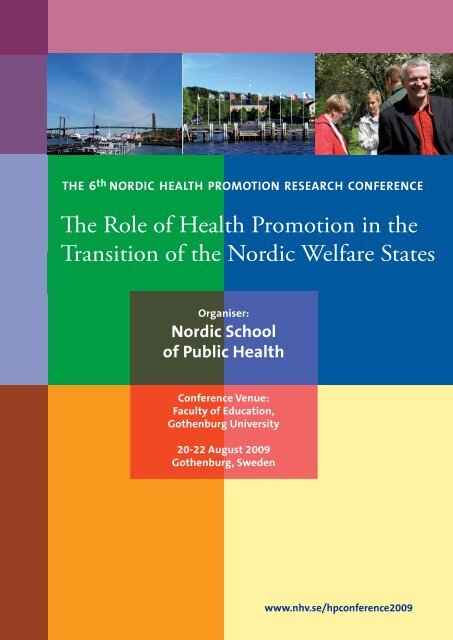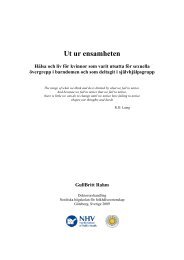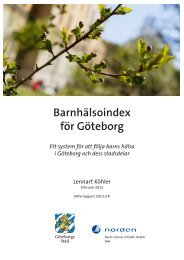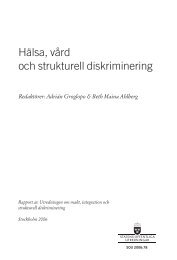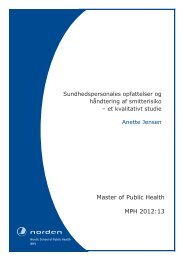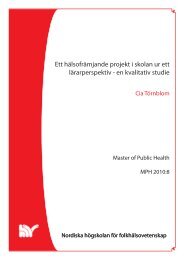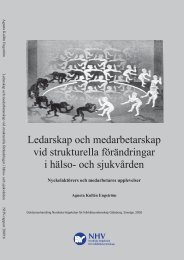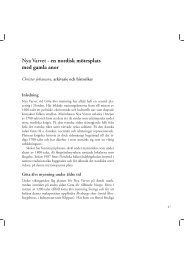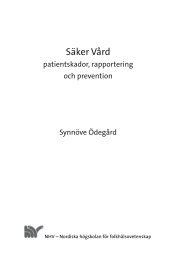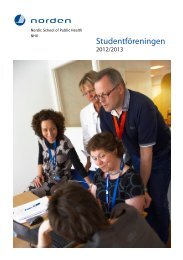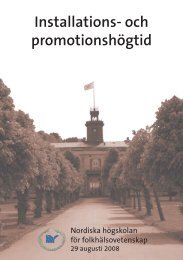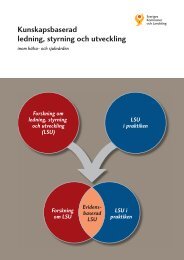Programme book
Programme book
Programme book
Create successful ePaper yourself
Turn your PDF publications into a flip-book with our unique Google optimized e-Paper software.
t h e 6 th n o r d i c h e a lt h pr o m o t i o n r e s e a r c h c o n f e r e n c e<br />
The Role of Health Promotion in the<br />
Transition of the Nordic Welfare States<br />
Organiser:<br />
Nordic School<br />
of Public Health<br />
Conference Venue:<br />
Faculty of Education,<br />
Gothenburg University<br />
20-22 August 2009<br />
Gothenburg, Sweden<br />
www.nhv.se/hpconference2009
The 6 th Nordic Health Promotion Research Conference 2009<br />
c o n t e n t s<br />
Welcome to the Conference 3<br />
Opening speakers 4<br />
Göteborg and Västra Götalandsregionen 4<br />
Conference programme 6<br />
Keynote speakers 22<br />
Practical information 24<br />
Social programme 26<br />
Transportation 26<br />
Göteborg city map 28<br />
scientific c o m m i t t e e<br />
Professor Karin C Ringsberg - Congress President, NHV<br />
Associate Professor Ina Borup - Congress President, NHV<br />
Associate Professor Elisabeth Fosse, Bergen University, NO<br />
Professor Bo J. A. Haglund, Karolinska Institutet, SE<br />
Associate Professor Ulrika Hallberg, NHV<br />
Àlfgeir Logi Kristjánsson, Reykjavik University, IS<br />
Professor Bengt Lindström, Folkhälsan Research Center, FI<br />
Senior Lecturer Lene Povlsen, NHV<br />
Associate Professor Christiane Stock, University of<br />
Southern Denmark, DK<br />
Professor Per Tillgren, Mälardalen University, SE<br />
Associate Professor Stefan Thorpenberg, NHV<br />
o r g a n i s i n g c o m m i t t e e<br />
Page 2 | The Role of Health Promotion in the Transition of the Nordic Welfare States<br />
From NHV: Karin Ringsberg, Ina Borup, Stefan Thorpenberg,<br />
Lene Povlsen, Evastina Björk, Ulrika Hallberg,<br />
Susann Regber, Anne Trollvik, Tanja Johansson, Emma<br />
Ricknell and Jenny Haagman Edwards.<br />
The 6 th Nordic Health Promotion Research Conference<br />
is organised by the Nordic School of Public<br />
Health (NHV) in Göteborg.<br />
The Nordic School of Public Health was established in<br />
1953 and is one of the Nordic Council of Ministers’<br />
institutions. We have a long experience and genuine<br />
knowledge within the field and offer an inspiring Nordic<br />
and international educational environment. Our<br />
students have relevant connections to working life and<br />
represent a broad spectrum of occupations. They take<br />
courses at the Nordic School of Public Health to gain<br />
further knowledge in order to better meet the needs<br />
they encounter in their professions.<br />
Please visit www.nhv.se for more information about the<br />
Nordic School of Public Health.
w e l c o m e t o t h e 6 th n o r d i c h e a l t h p r o m o t i o n re s e a rc h c o n f e r e n c e<br />
Dear colleagues,<br />
The 6 th Nordic Health Promotion Research Conference 2009<br />
We wish you a warm welcome to the 6th Nordic Health Promotion Research Conference: “The Role of<br />
Health Promotion in the Transition of the Nordic Welfare States”.<br />
This conference gives us the opportunity to meet partners from other countries<br />
with the same interest in research and also to establish friendship and co-operation<br />
with new colleagues across disciplines and countries. From an interdisciplinary<br />
and multi-professional perspective it is important to expand our knowledge and<br />
understanding of the public health area with a special focus on health promotion.<br />
It is therefore important to share research findings and methodological knowledge<br />
with each other across disciplines and countries. The development of a broad<br />
multi-disciplinary approach towards health promotion should be encouraged.<br />
The abstracts in the conference programme give rise to expectations of interesting<br />
presentations from colleagues representing all the Nordic countries, some European<br />
states and even countries outside Europe. In addition to this, the invited<br />
International and Nordic keynote speakers will highlight the important topics<br />
within health promotion such as health policy, vulnerable populations, equity<br />
in health and cultural capital. We hope that this conference will illuminate the<br />
broad aspects of health promotion and show the needs for and benefits of this<br />
research.<br />
We are taking the opportunity to thank the Scientific and Organising Committees<br />
for the tremendous work without which there would have been no conference!<br />
We would also like to thank the sponsors that have supported the conference.<br />
Ina Borup<br />
Karin Ringsberg<br />
On behalf of the Organising Committee we once again wish you welcome to Göteborg. We hope that<br />
the conference will be an asset to your knowledge and inspire you to continue your work and research<br />
within health promotion.<br />
Ina Borup Karin Ringsberg<br />
Associate professor Professor<br />
President of the Conference President of the Conference<br />
The Role of Health Promotion in the Transition of the Nordic Welfare States | Page 3
The 6 th Nordic Health Promotion Research Conference 2009<br />
o p e n i n g s p e a k e r s<br />
Göran Bondjers<br />
Dean and Director,<br />
Nordic School of<br />
Public Health<br />
c i t y o f g ö t e b o r g a n d<br />
v ä s t r a g ö t a l a n d s r e g i o n e n<br />
Maria Larsson<br />
Minister of Elderly<br />
Care and Public<br />
Health, Sweden<br />
Johan Jonsson<br />
Director of Public Health,<br />
Västra Götalands Region<br />
Halldór Ásgrímsson<br />
Secretary General,<br />
Nordic Council of<br />
Ministers<br />
Göteborg is Sweden’s second largest city and is situated in the heart of Scandinavia, between the Swedish, Danish<br />
and Norwegian capitals. It was founded in 1621 and has the population of approximately 500 000 inhabitants.<br />
Göteborg has a long and successful tradition of trade and industry, and some of Scandinavia’s best known corporations<br />
such as Volvo, SKF, ESAB, Hasselblad have their origins and head offices here. A significant proportion<br />
of Sweden’s exports and imports pass through Göteborg’s port, the largest in the Nordic region. Göteborg is also<br />
known for its two universities, Opera House, Book Fair, Gothia Cup, Liseberg Amusement Park, 25 theatres,<br />
International Film Festival, Volvo Ocean race and a lot of other culture and sports events. Please visit the web site<br />
www.goteborg.com for more information.<br />
Region Västra Götaland was formed in 1999 and unites 49 municipalities. Göteborg is its administrative capital.<br />
Västra Götalandsregionen is one of the country’s biggest employers and is responsible for health care and medical<br />
treatment as well as for the region’s growth and development.<br />
The highest decision-making body is the Regional Council. Its 149 members are directly elected by the region’s<br />
inhabitants every four years.<br />
The Region’s political activities are coordinated and lead by the Regional Executive Board that consists of 15 fulltime<br />
politicians from both the majority parties and the opposition. The Boards operates via its committees such as<br />
healthcare committee, hospital and primary healthcare boards, regional development committee, environmental<br />
and cultural affairs committees. More information is available on www.vgregion.se.<br />
Page 4 | The Role of Health Promotion in the Transition of the Nordic Welfare States
The Role of Health Promotion in the Transition of the Nordic Welfare States | Page 5<br />
Photo: James Holm. The statue Poseidon at the top of Avenyn.
Page 6 | The Role of Health Promotion in the Transition of the Nordic Welfare States
Page 10 | The Role of Health Promotion in the Transition of the Nordic Welfare States
The Role of Health Promotion in the Transition of the Nordic Welfare States | Page 11
Page 12 | The Role of Health Promotion in the Transition of the Nordic Welfare States
The Role of Health Promotion in the Transition of the Nordic Welfare States | Page 13
Page 14 | The Role of Health Promotion in the Transition of the Nordic Welfare States
The Role of Health Promotion in the Transition of the Nordic Welfare States | Page 15
Page 16 | The Role of Health Promotion in the Transition of the Nordic Welfare States
The Role of Health Promotion in the Transition of the Nordic Welfare States | Page 17
Page 18 | The Role of Health Promotion in the Transition of the Nordic Welfare States
The Role of Health Promotion in the Transition of the Nordic Welfare States | Page 19
Page 20 | The Role of Health Promotion in the Transition of the Nordic Welfare States
The Role of Health Promotion in the Transition of the Nordic Welfare States | Page 21
The 6 th Nordic Health Promotion Research Conference 2009<br />
k e y n o t e s p e a k e r s<br />
Thomas Abel is Professor for Health Research at the Department of Social and Preventive Medicine<br />
of the University of Bern, Switzerland. He is also Co-Editor-in-Chief of the International Journal<br />
of Public Health. Prior to his appointment in Bern he was Professor for Public Health and Epidemiology,<br />
Postgraduate Program Public Health, Dep. of Medicine at the Ludwig-Maximillians-University,<br />
Munich, FRG (1993 - 95), Research Assistant and Lecturer in Medical Sociology, Dep. of Medicine at<br />
the Philipps-University, Marburg, FRG (1986 - 93), as well as Teaching and Research Assistant, Dep. of<br />
Sociology at the University of Illinois, Urbana-Champaign, USA (1984 – 86). He has served as a reviewer<br />
and consultant for major national and international research institutions and funding agencies.<br />
Academic training: Prior to his Habilitation at the Philipps-University (Dep. of Medicine, 1993), Thomas<br />
Abel received his Ph.D. from the University of Illinois (Dep. of Sociology) in 1989, a Dr. phil.<br />
degree from the Justus Liebig-University (Dep. of Sports Science) in 1984, and, also there, his M.A.<br />
degree in 1980. Today, his major focus in research and teaching is on the role of social, cultural and<br />
economic resources in the reproduction of health inequalities.<br />
Espen Dahl has a PhD in sociology from 1994. He is Professor and Head of the Interdisciplinary<br />
Research <strong>Programme</strong> Care, Health and Welfare at Oslo University College. Part of his research is undertaken<br />
at Research Group for Inclusive Welfare Policies. Espen Dahl’s research interests are health and<br />
welfare policies in comparative perspective, active labour market policies, research on social assistance<br />
dynamics and social exclusion, and health inequality research. He has published extensively on these<br />
topics.<br />
Pernille Due is Research <strong>Programme</strong> Director, Senior Researcher, MD Research <strong>Programme</strong> on Child Health at the Institute<br />
of Public Health Southern University of Denmark. She is the Principal Investigator for the Health Behaviour in Schoolaged<br />
Children (HBSC) survey in Denmark. She has been a member of the International HBSC Scientific Committee in several<br />
periods and is now Deputy International Coordinator for HBSC. Since 2006, Pernille has been Coordinator of the Social<br />
Inequality Focus Group. She has also been coordinating the bullying writing group, since it started in 2006. She established<br />
the Support Centre for Publications (SCP) for the HBSC publications. Furthermore, she was the Danish PI in the EU-funded<br />
European project: PRO Children and has been involved in many more projects, mostly on children’s health behaviour, but also<br />
women’s and elderly people’s health. She has a vast scientific production on children’s health and health behavior with focus on<br />
risk factors, inequality, bullying, nutrition and overweight.<br />
Olle Lundberg is Professor of Health Equity Studies and Director of CHESS, Centre for Health<br />
Equity Studies, Stockholm University. His main research interests have included welfare research,<br />
health inequalities and social determinants of health. His publications cover topics such as the size and<br />
trends of health inequalities in Sweden and internationally; welfare trends in Sweden during the crisis<br />
in the 1990s; income, relative deprivation and health; the importance of childhood conditions for adult<br />
health; Sense of Coherence and its connection to health; and health among older adults.<br />
Page 22 | The Role of Health Promotion in the Transition of the Nordic Welfare States
The 6 th Nordic Health Promotion Research Conference 2009<br />
Eeva Ollila, MD, adjunct professor (health policy), specialist in public health medicine, is currently working as Ministerial<br />
Advisor in the Finnish Ministry of Social Affairs and Health, having responsibilities, among others, on health in all policies<br />
(HiAP) on national level, as well as with the EU and the WHO. Before joining the Ministry she worked at the National Research<br />
and Development Centre for Welfare and Health (Stakes), the World Health Organization, the European Commission,<br />
as a clinician and as a consultant on global health. She has published on national, EU and global health policy, including health<br />
care policies, pharmaceutical policies and HiAP. For the Finnish EU Presidency health theme on HiAP in 2006, she was one<br />
of the editors of the Presidency <strong>book</strong> and one of the authors of the accompanying policy brief.<br />
Louise Potvin completed her doctorate in Public Health from Université de Montréal and post<br />
doctoral training in program evaluation. She is currently professor at the Department of Social and<br />
Preventive Medicine, Université de Montreal and Scientific director of the Centre Léa-Roback sur<br />
les inégalités sociales de santé de Montréal. She holds the CHSRF/CIHR Chair on Community Approaches<br />
and Health Inequalities. This Chair aims at documenting how public health interventions in<br />
support to local social development contribute to the reduction of health inequalities in urban settings.<br />
Her main research interests are the evaluation of community health promotion program and how local<br />
social environments are conducive of health. She was a member of the WHO Working Group on the<br />
evaluation of health promotion. She participated to several Federal-Provincial-Territorial committees<br />
related to population health. She is a globally elected member of the Board of Trustees of the International<br />
Union for Health Promotion and Education and a Fellow of the Canadian Academy of Health<br />
Sciences. She has published more than 120 peer reviewed papers, 30 <strong>book</strong> chapters and 4 <strong>book</strong>s.<br />
Thorolfur Thorlindsson earned a B.A. in social science at the University of Iceland in 1972, an<br />
M.A. in Sociology in 1974 and a Ph.D. in sociology 1977 from the University of Iowa. He has been at<br />
the University of Iceland since 1976 where he became a full professor in 1980. During that time he has<br />
chaired the Social Science Faculty for 9 years, served on the University Council and chaired several University<br />
boards and committees. Thorolfur Thorlindsson has also served as vice chairman of the National<br />
Science Research Council and as chairman of the National Council on Prevention, as well as the editor<br />
of Acta Sociologica. He has been a visiting scholar at the Max Plank Institute in Berlin, Columbia<br />
University, North Carolina State University and The Thomas W. Rivers Distinguished Professor of International<br />
Studies at East Carolina University. Thorolfur is the author and coauthor of about hundred<br />
publications including 8 <strong>book</strong>s and monographs and more than 70 research articles in refereed journals.<br />
His current research focuses on three overlapping areas: 1) relationship of science to policy and practice<br />
with reference to health promotion; and prevention; 2) the role of community and neighborhoods in<br />
the welfare of adolescents; 3) the multilevel influence of social factors on risk and health behavior. He<br />
was the director of the Public Health Institute from August 2007 to Mars 2009.<br />
Signild Vallgårda is Professor of Health Policy Analysis at the Department of Public Health,<br />
University of Copenhagen. She is trained as a historian and her research has previously focused on the<br />
Danish hospital development, maternity care and health care policy in the 20th century. 1997-2003 she<br />
was a member of The Danish Study on Power and Democracy. Her present research focuses on public<br />
health policies in a historical and comparative perspective. The issues addressed deal with the exercise of<br />
power from two angles, the power exercised in setting the political agenda and defining problems to be<br />
dealt with, their causes and solutions, and the power exercised in the efforts to improve the health of the<br />
population by changing their behaviour. The studies concern both present policies and the changes occurring<br />
during the last century and the countries studied are Denmark, Sweden, Norway and England.<br />
Some recent publications are: Vallgårda S. Social inequality in health: dichotomy or gradient? A comparative<br />
study of problematisations in national public health programmes. Health policy. 2008;85:71–82.<br />
Vallgårda S. Problematisations and path dependency: HIV/AIDS policies in Denmark and Sweden<br />
Medical History, 2007; 51:99-112. Vallgårda S. Widening the scope - targeting the interventions - creating<br />
risk groups. Maternal and child health in Denmark and Sweden from 1930s and onwards. Journal<br />
of Epidemiology and Community Health. 2008;62:382-86. Vallgårda S. Folkesundhed som politik.<br />
Danmark og Sverige 1930 til i dag. Århus: Aarhus Universitetsforlag, 2003.<br />
The Role of Health Promotion in the Transition of the Nordic Welfare States | Page 23
The 6 th Nordic Health Promotion Research Conference 2009<br />
p r a c t i c a l i n f o r m a t i o n<br />
Conference Venue<br />
Faculty of Education (”Pedagogen” in Swedish),<br />
Gothenburg University<br />
Address: Västra Hamngatan 25<br />
Homepage: www.ipd.gu.se<br />
Registration desk<br />
The registration desk is located at Building C and is open<br />
09.00 – 12.30 on Thursday, 20th August.<br />
Name badges will be provided at the registration desk. All<br />
participants are requested to wear the badge throughout the<br />
Conference.<br />
Help desk<br />
The Help desk is open during the conference hours and is<br />
located outside the Assembly Hall (Kjell Härnqvist Audito-<br />
Oral Presentations<br />
The session rooms are equipped with a PC, a projector and a whiteboard. Please do not use your own laptops for presentations<br />
during the sessions as it requires time to set up them to work with a projector. All presentations, received by the Conference<br />
Secretariat before the 13 th August, have been uploaded into the respective computers. Please be in your session room on time<br />
in order to check if your presentation is uploaded.<br />
Poster Presentations<br />
Poster mounting: 09.00-12.30 on Thursday, 20th August.<br />
Mounting items (pins) will be available on site (Building A, outside the Assembly Hall/ Kjell Härnqvist Auditorium)<br />
Poster demounting: after 14.00 on Saturday, 22nd August<br />
Please observe that the left posters will be destroyed.<br />
Printing and photocopying facilities<br />
Only single copies can be printed out or copied at the Help desk.<br />
rium) at Building A. Please contact the Help desk for any<br />
questions.<br />
Registration fee includes:<br />
• Admission to all conference sessions<br />
• Conference material<br />
• Coffee/tea and fruit (four times during the<br />
conference)<br />
• Lunch (21st and 22nd August)<br />
• Welcome reception, 20th August (outside the Assembly<br />
Hall - Kjell Härnqvist Auditorium at Building A)<br />
• Conference dinner, 21st August - the City Hall ”Börsen”<br />
Certificate of Attendance<br />
A Certificate of attendance is available at the Help desk.<br />
Internet access<br />
The computers installed in the group rooms have access to Internet.<br />
Participants bringing their own note<strong>book</strong>s can use wireless internet connection available in the conference venue. Please contact<br />
the Help desk to get the access code.<br />
Conference meals<br />
Lunches on 20th and 21st August, four coffee breaks, welcome reception on 20th August and conference dinner on 21st August<br />
are included in the registration fee. Other meals are at your own expense. Please contact the Help desk for suggestions on<br />
restaurants.<br />
Lunch will be served outside the Assembly Hall (Kjell Härnqvist Auditorium) on Friday and Saturday by the catering service<br />
”Malins Skafferi”.<br />
Coffee/tea and fruit will be served four times during the Conference outside the Assembly Hall (Kjell Härnqvist Auditorium).<br />
Page 24 | The Role of Health Promotion in the Transition of the Nordic Welfare States
Smoking policy<br />
The 6 th Nordic Health Promotion Research Conference 2009<br />
Smoking is not permitted inside the Conference venue. Smoking is also banned in most public places (transport, stores, restaurants,<br />
etc.).<br />
Cloakroom<br />
Please observe that only an unguarded cloakroom is available. Neither Conference Secretariat nor the Faculty of Education are<br />
responsible for damage and loss of valuables of any kind.<br />
Photographing / recording<br />
Please observe that photographs will be taken during the conference, welcome reception and conference dinner. Some of them<br />
will then be published at www.nhv.se. Should you not wish to be photographed, contact the Help desk.<br />
If you intend to record any presentation please obtain the speaker’s permission first.<br />
Conference evaluation<br />
Please complete the evaluation form found in your delegate bag and hand it in at the Help desk. Should you leave without<br />
doing it, please fax it to +46 (0)31 69 17 77.<br />
Currency exchange<br />
The currency is the Swedish Crown (SEK). The exchange rate is 1€ ≈ 10.5 SEK.<br />
Forex Bank Kungsportsplatsen. Opening hours 9am - 7pm, Saturdays 9am - 4pm, Sunday closed.<br />
Restaurants<br />
Some of the most famous Swedish chefs are to be found in Göteborg, and it is here one finds the highest number of first-class<br />
restaurants per capita in the whole of Scandinavia. The main culinary attraction in Göteborg is the local seafood; prawns,<br />
lobster and a wide selection of fish. Please contact the Help desk for more information.<br />
The tourist offices have details of what’s happening in Göteborg during your visit and offer<br />
expert advice on various events.<br />
Phone: +46 (0)31-61 25 00, e-mail: turistinfo@goteborg.com,<br />
opening hours 9.30am - 6pm.<br />
Important phone numbers<br />
SOS 112<br />
Police 114 14<br />
Sahlgrenska University<br />
Hospital 031-342 00 00<br />
Dental care (urgent)<br />
TandläkarHuset,<br />
Kungsportsavenyen 30,<br />
phone: 031-18 06 05<br />
Tandakuten,<br />
Engelbrektsgatan 34 C,<br />
phone: 031-16 54 49<br />
Pharmacy<br />
Apoteket Shop,<br />
Korsgatan 24<br />
Time zone<br />
Sweden is one hour<br />
ahead of GMT.<br />
The Conference Venue - Faculty of Education ”Pedagogen”.<br />
The Role of Health Promotion in the Transition of the Nordic Welfare States | Page 25
The 6 th Nordic Health Promotion Research Conference 2009<br />
s o c i a l p r o g r a m<br />
Reception - Thursday 20 th August, 18.00-20.00<br />
The Conference hosts invite you to enjoy the mix and mingle buffet in the informal atmosphere of communication with your<br />
colleagues. Sir Bourbon Dixieland Band plays classic jazz. The reception is held in the Conference venue.<br />
Dinner - Friday 21st August, 19.00<br />
You are invited to a dinner at the City Hall, called Börsen (the Exchange Stock). It was built between 1844 and 1849 as a commodity<br />
exchange and meeting place for merchants as well as banqueting rooms for the town authorities. It is situated in the<br />
city centre, within the walking distance from the Conference venue (see the map on the back of the cover).<br />
Liliane Håkansson performs some of the Nordic folk songs.<br />
Please bring with you the entrance ticket. You find it among the conference material.<br />
Address: Köpmansgatan 20, phone: 031 368 00 00<br />
t r a n s p o r t a t i o n<br />
How to get to the Conference venue (“Pedagogen” – Faculty of Education):<br />
From the airports<br />
The Airport buses operate between Landvetter Airport and the city centre. Take the Airport bus to ”Korsvägen” and then<br />
tram 2 (destination Högsbotorp) to ”Grönsakstorget”. The trip takes about 45 minutes.<br />
If you arrive at Gothenburg City Airport the airport bus leaves the airport for ”Nils Ericson Terminal” 50 min after the scheduled<br />
flight arrival. The trip takes about 30 minutes. From Nils Ericson Terminal you can walk to the Central railway station<br />
to take a tram.<br />
From the Central railway station/Nils Ericsson Terminal<br />
Take a tram from ”Centralstationen” to stop ”Grönsakstorget”:<br />
Tram 1 (destination Tynnered), Tram 2 (destination Högsbotorp), Tram 9 (destination Kungssten), Tram 11 (destination<br />
Saltholmen) or Tram 13 (destination Linnéplatsen). It takes about 6 minutes to get there.<br />
Ticket information<br />
It is not possible to buy tickets on board. Tickets must be bought in advance at a news-stand (“Pressbyrån” in Swedish),<br />
7-Eleven shops or public transport info points (“Västtrafik”).<br />
There are different types of tickets: a prepaid 100 SEK card (“Maxirabatt”, is enough for about 6 trips within Gothenburg,<br />
when you stamp on board, press “2”), a short-term ticket/card (valid for one (65 SEK) or three days (130 SEK)). It is also<br />
possible to buy tickets by sending a text message to 724 50 (if you have a Swedish mobile phone operator).<br />
Taxi<br />
VIP taxi: 031-27 16 11 or 031-27 02 70<br />
Taxi 020 - Göteborg: 020-93 93 00<br />
Mini taxi: 031-140 140<br />
Page 26 | The Role of Health Promotion in the Transition of the Nordic Welfare States<br />
Parking<br />
There are 200 chargeable parking spaces for private cars in a<br />
garage under Pedagogen, Building B.<br />
Entrance/exit Sahlgrensgatan.
t h e s p o n s o r s o f t h e 6 th n o r d i c h e a l t h p r o m o t i o n re s e a rc h c o n f e r e n c e<br />
The conference is supported by the following organisations and enterprises:<br />
Nordic council of Ministers<br />
Swedish National Institute of Public Health<br />
The 6 th Nordic Health Promotion Research Conference 2009<br />
Region Västra Götaland<br />
Swedish Research Council<br />
Flower shop Rosengården Flower shop Blomsterlandet<br />
The Role of Health Promotion in the Transition of the Nordic Welfare States | Page 27
The 6 th Nordic Health Promotion Research Conference 2009<br />
g ö t e b o r g c i t y m a p<br />
Conference Venue: Faculty of Education – ”Pedagogen”<br />
Conference Venue<br />
Västra Hamngatan 25, House A<br />
Registration and Conference Opening<br />
Läroverksgatan 5, House C<br />
Börsen - Venue Conference Dinner<br />
Östra Hamngatan 21<br />
Central Station and Bus Terminal<br />
Drottningtorget


